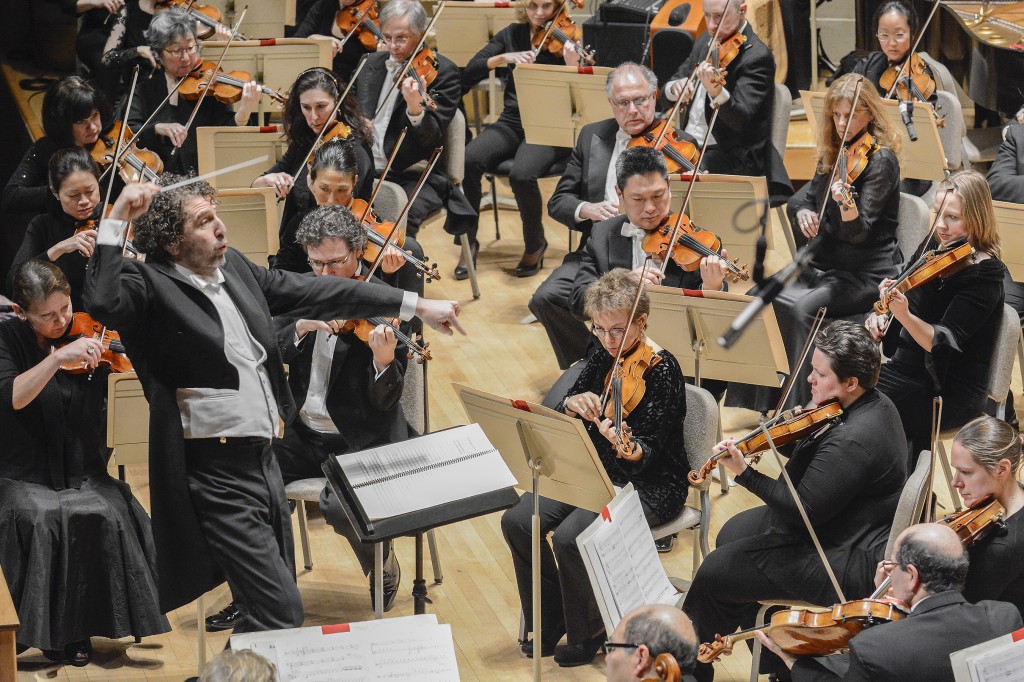BSO, Fisch dig out with mixed program of Dorman, Prokofiev, Schumann
If the Boston Symphony Orchestra under guest conductor Asher Fisch sounded a little snowbound Thursday night, one could hardly blame it.
Even without knowing the details of whose plane was delayed by the mid-week blizzard or how many rehearsal hours were lost to the two-day shutdown of roads and transit, one had to expect some rough spots, and be glad for those moments when players and conductor came together.
The piece that sounded the best prepared was the least familiar one, Avner Dorman’s Astrolatry, which opened the program. Of the two that followed, Prokofiev’s Violin Concerto No. 2 sounded out of focus behind a strong performance by soloist Julian Rachlin, and Schumann’s Symphony No. 1, despite a vigorous reading by Fisch and the players, came off as somewhat blunt and lacking in charm.
The Israeli-born Dorman’s 2011 piece, on the other hand, had plenty of charm, though it had to share the first movement with some pounding action-movie music. The title means “worship of the stars,” and its two movements were devoted, respectively, to the stars and the worshippers.
The stars inspired music reminiscent of those old planetarium shows that were equally about science and Greek mythology, the nebula in the constellation Orion and the mythical adventures of Orion the Hunter himself. Tiny percussion sparkles and woodwind squiggles suggested stars coming out and beginning to fill the sky, and then suddenly all was pounding hooves and chariot wheels, and then back to more sparkles.
There was no such ambivalence among the second movement’s star-worshipping humans, however. They started loud and got louder, driven by a booming bass drum and the whack of double basses played col legno, with the wood side of the bow.
It seemed that conductor and orchestra had given much care and attention to rendering Dorman’s unusual starry effects, and even the primal racket of the second movement sounded well drilled. The modest-sized Thursday audience liked the piece, and cheered the composer when he came onstage for a bow.
Prokofiev’s Second Violin Concerto, composed in 1935, is generally billed as representing the composer’s “nice guy” period, like its tuneful contemporary, the ballet Romeo and Juliet—while the First Concerto is typical of the dissonant “bad boy” Prokofiev of the 1920s. In fact, it’s not as simple as that; the lyricism of the Second Concerto is rather understated, and needs projection from the soloist to register with the audience.
Rachlin did soar satisfyingly over the orchestra at times, and he and the orchestral violins created some lovely moments together. But it was a performance notable mainly for those rugged Prokofiev virtues of bright articulation and biting rhythms, not for sweetness of tone or sentiment.
In contrast to the self-assured Rachlin, the orchestra seemed often to be feeling its way, with overly acidic-sounding wind chords and horns frequently late and out of tune. The delicate, serenade-like opening of the second movement accompanied the soloist adequately, but without the magic this orchestra can weave on a good night. And although the bass drum got another workout in the concerto’s finale, it was soloist Rachlin who had to supply most of the movement’s propulsive power.
Propulsion, on the other hand, was what it was all about in Thursday’s performance of Schumann’s “Spring” Symphony. As is often noted, this composer wrote for the orchestra as if it was the world’s biggest piano; in his symphonies as in his keyboard pieces, the main virtues are attractive melodies, harmonic surprises, and catchy rhythms, not variety of instrumental tone.
With enough preparation, a Schumann symphony can come across as moody and colorful in performance, and its many repetitions can sound fresh each time. Or, as on Thursday, a conductor can jab the baton, light up those rhythms, and create quite an effect that way.
Even as the first movement drove ahead, conductor Fisch asked for, and got, some nice contrasts of gracefulness and vigor in the phrasing. The thickness of Schumann’s scoring was mitigated by well-managed balance between the sections and the transparent acoustics of Symphony Hall.
Paradoxically, Schumann’s mood of child-like openness—einfach (simply) is one of his favorite markings—requires much practice to achieve, and it was missing from this symphony’s Larghetto on Thursday. Instead, Fisch went for a more robust reading, with thick string tone and “hairpins” on every note that interfered with the long line. The horns continued to struggle with late entrances and broken notes.
Happily, the Scherzo posed few difficulties for Fisch and the players, who gave the main theme a jolt of Schubertian energy and delivered the two contrapuntal trios crisply and clearly. In the finale, they weren’t quite together on the coy little starts and stops of the main theme, but they came to exuberant agreement in the closing pages.
All in all, Thursday’s concert went well for a first outing on a rough week. Two more performances of this program remain, and there’s no reason to think this band and this conductor won’t raise their game considerably when they’ve shaken the snow off.
The program will be repeated 1:30 p.m. Friday and 8 p.m. Saturday. bso.org; 617-266-1200.
Posted in Performances
